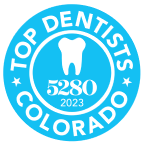 Do you wake up with headaches, earaches, or severe jaw pain? You could be grinding your teeth in your sleep. This condition, called bruxism, can be caused by several different factors, including stress, orthodontic misalignment, medical conditions, and TMJ issues. Today, our team at Metropolitan Dental Care explores the dangers of grinding your teeth and discusses treatment options to address the problem.
Do you wake up with headaches, earaches, or severe jaw pain? You could be grinding your teeth in your sleep. This condition, called bruxism, can be caused by several different factors, including stress, orthodontic misalignment, medical conditions, and TMJ issues. Today, our team at Metropolitan Dental Care explores the dangers of grinding your teeth and discusses treatment options to address the problem.
How Can I Know if I’m Grinding My Teeth?
The majority of individuals who grind their teeth do so in their sleep, but sometimes this can occur during the day as well. No matter when the teeth grinding occurs, many patients are unaware that it is happening. Some of the most commonly associated symptoms of bruxism include:
- Jaw pain
- Pain in the neck or face
- Headaches
- Earaches
- Tinnitus (ringing in the ears)
- Inability to open your mouth completely
- Popping or clicking of the jaws
- Sores from biting the insides of the cheeks
What Are the Dangers of Grinding Teeth?
Bruxism can occur short- or long-term. Some cases may be mild enough that intervention is not required. However, if the condition is persistent and remains untreated, it can lead to a wide range of concerns, including:
- Tooth erosion
- Damage to existing dental restorations
- Temporomandibular joint disorder (TMD)
- Chronic headaches
- Severe or unmanageable facial pain
- Tooth mobility
- Gum recession
- Insomnia
- Tooth loss
As you can see, if the effects of bruxism go untreated, patients may require much more extensive (and expensive) treatments in the future. That’s why it is so important to visit your dentist as soon as you suspect there may be a problem.
How to Treat Bruxism
There are several avenues we can take when addressing teeth grinding at our Denver practice. The treatment option recommended will depend on a few different factors, including the cause and severity of your bruxism. Some of the most common bruxism treatments include:
- Custom oral appliances: To protect your teeth from damage, we can create a custom oral appliance. This device fits snugly over your teeth and keeps them slightly separated and cushioned. Most patients need to wear their oral appliance at night. However, if you are suffering from daytime bruxism, an appliance can be worn during the waking hours as well.
- Orthodontic treatment: If misalignment is contributing to your bruxism, then orthodontic treatment may be an option. At Metropolitan Dental Care, on on-staff orthodontist, Anil J. Idiculla can recommend braces or Invisalign® based on your specific needs.
- Medications: If your condition is due to anxiety or stress-related issues, a muscle relaxant can help your jaw remain comfortable and less tense during sleep.
- BOTOX®: Cases in which teeth grinding is related to TMJ issues may be treatable with BOTOX injections. This substance actually relaxes the associated muscles and can therefore reduce symptoms in some instances. Keep in mind that BOTOX is a temporary solution. Patients who choose this option will require touch-up procedures every few months to maintain results. Typically, BOTOX is only recommended when all other options have been exhausted. If your doctor thinks this treatment is right for you, he or she will refer you to the appropriate specialist.
Contact Us for More Information
Are you suffering from symptoms associated with grinding teeth? If so, schedule a consultation with your Denver dentist today. Metropolitan Dental Care is proud to serve individuals and families in Lone Tree, Centennial, Parker, and Highlands Ranch as well. Contact us online or give us a call at 303-534-2626.

